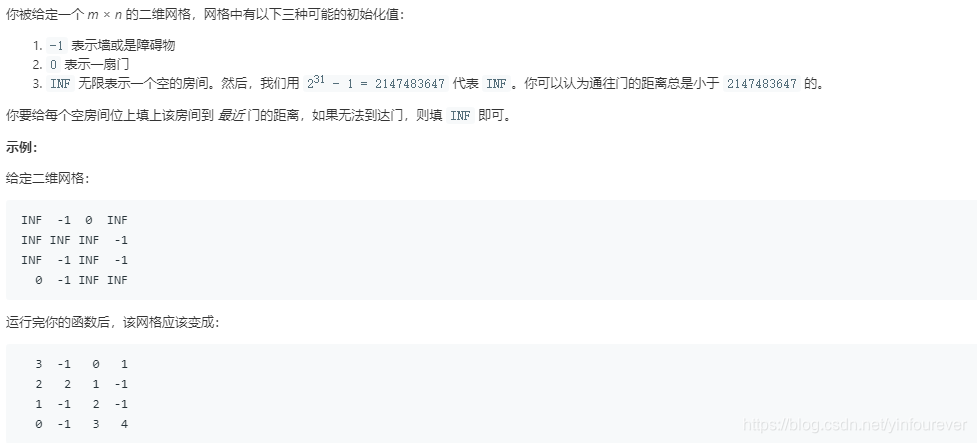
思路1: DFS,对于每个门进行一次DFS搜索,记录每个位置对每个门的距离,当有更小距离的门时更新这个数值
public void WallsAndGates(int[][] rooms) {for (int i = 0; i < rooms.GetLength(0); i++){for (int j = 0; j < rooms[i].GetLength(0); j++){if (rooms[i][j] == 0){DFS(rooms, i, j, 0);}}} }void DFS(int[][] rooms, int x, int y, int val){if (x < 0 || x >= rooms.GetLength(0))return;if (y < 0 || y >= rooms[x].GetLength(0))return;if (rooms[x][y] < val)return;rooms[x][y] = val;DFS(rooms, x + 1, y, val + 1);DFS(rooms, x, y + 1, val + 1);DFS(rooms, x - 1, y, val + 1);DFS(rooms, x, y - 1, val + 1);}思路2: 多源BFS,先把每个门都压入队列中,然后进行BFS搜索,BFS搜索保证了每个位置只需要遍历到一次,第一次搜索到时一定是最短距离,因此这种算法对于大量数据时肯定会更优秀
private List<int[]> directions = new List<int[]>(){new int[]{1, 0}, new int[]{-1, 0},new int[]{0, 1},new int[]{0, -1}};
private const int INF = 2147483647;
public void WallsAndGates(int[][] rooms){Queue<int[]> queue = new Queue<int[]>();int maxRow = rooms.GetLength(0);if(maxRow == 0)return;int maxCow = rooms[0].Length;for (int i = 0; i < maxRow; i++){for (int j = 0; j < maxCow; j++){if (rooms[i][j] == 0){queue.Enqueue(new int[]{i,j});}}}while(queue.Count > 0){int[] tile = queue.Dequeue();for(int i = 0; i < directions.Count; i++){int x = tile[0] + directions[i][0];int y = tile[1] + directions[i][1];if(x < 0 || x > maxRow - 1 || y < 0 || y > maxCow - 1 || rooms[x][y] != INF){continue;}rooms[x][y] = rooms[tile[0]][tile[1]] + 1;queue.Enqueue(new int[]{x, y});}} }
}判题的结果是两者时间差不多太多,都在340ms左右,但是明显在数据量大的情况下应该是多源BFS算法更优秀很多。多源BFS最快是328ms,第一次的704ms是因为用了List没有Queue


单线多拨实现网速叠加)

沟通背后的行为心理学)



和事件)

)



团队激励背后的行为心理学)




...)